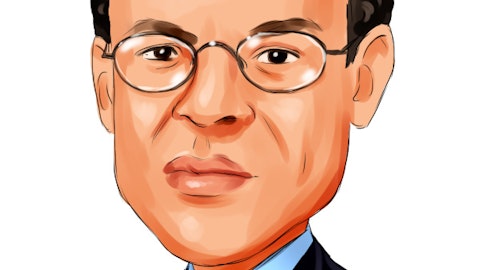Michael Sarner: So, yes, there’s liquidity out there in the private equity market. And yes, they’re out looking for acquisitions. And hopefully, in the next 12 months, there’s a bunch of sponsors. I think they’ll have a nice opportunity to add some very accretive acquisitions. So that’s definitely the case. I would also say that private equity firms, they’re smart, right? And they’re actively managing these companies their spreads are widening on their rent spreads, the index and so their cost of their debt is going up, and they’re thinking about a recession like all of us on the call are, right? All of people listening to this call are thinking about that, right? And so what are the private equity firms are doing? I mean their cost of debt going up and they’re thinking about recession.
So they’re leaning in and really actively looking at cost structures — and candidly, I think that’s probably — that’s really imposing really good discipline on these companies. And so, I think that’s going to benefit the companies in the long run. The increased index or the cost of debt going up and poses discipline on the cost structure of a business. That’s one thing. And then as I think about recessions and all that, they’re imposing discipline also on the cost structures as well. And so we’ll see. I mean, we’ll see where that results in the layoffs or what have you. But I do think the dynamic — to answer your question, private equity firms are kind of doing and signaling yes, liquidity, yes, acquisitions, but also unenhanced discipline on looking at their cost structures, which I think is helping.
Bowen Diehl: And we’ve also seen the company that have come to us with amendments or waivers or companies that might be having a little bit of trouble. They been willing and able to fund into these companies. Those negotiations have gone well. There’s no signs that they’re taking — there’s a dooming recession coming and that they’re kind of taking the keys to us. They’ve been pretty productive in conversations across the board.
Michael Sarner: Yeah. That’s a good point. And very transparent on what they want to do with the business as well.
Erik Zwick: Yeah. That’s the commentary. I appreciate it. Thanks for taking my questions today.
Bowen Diehl: Thank you, Erik.
Operator: Thank you. And one moment for our next question. And our next question comes from the line of Robert Dodd with Raymond James. Your line is open. Please go ahead.
Robert Dodd : Hi, guys. And congratulations on the quarter. Kind of a follow-up, but the leverage question on a very beginning of your opening remark, you talked about leverage being a full turn lower in some cases on new originations, and that’s driving that is portfolio leverage down a little. But can you give us any color on what’s the driver? Is it the sponsors with lower asks? Or is it lenders kind of holding the line? Because obviously, if leverage is a turn lower, even with rates up 250 basis points, you might be underwriting the interest coverage where it was a year ago, i.e. it’s very different with that leverage and the rate dynamic that both work together. So — but is it really the sponsors that are asking less to your point, being disciplined? Or is it the lenders holding the line?





